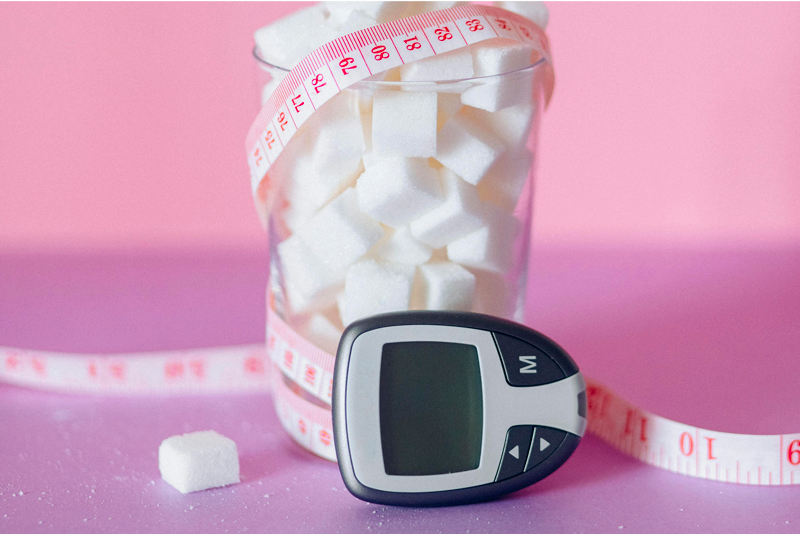
Did you know that your nights influence more than just your mood the next day? The quality and duration of your sleep have a direct impact on your blood sugar levels. To understand the importance of sleep and its regulatory role, you need to understand blood sugar and its fluctuations. We will guide you through this new approach to preventing and managing pre-diabetes and diabetes itself.
Do you understand blood sugar and its importance in health?
What is blood glucose?
Glycaemia is the level of essential sugar in your blood, a vital indicator that reflects how mych energy is available to your cells. A bit like petrol for a car, without a stable level the whole system could break down. Imagine the dire consequences if your body did not have an adequate supply of this resource: your vital functions could be compromised!
The consequences of unbalanced blood sugar levels
What happens when this delicate balance is upset? Chronic hyperglycaemia can cause you to wake up frequently at night, while hypoglycaemia can result in cold sweats and piercing anxiety in the middle of the night. Your sleep is fragmented and less restful – which can have a major impact on the quality of your waking life.
This nocturnal glycaemic rollercoaster has repercussions that go far beyond simply disturbing your rest: it affects your mood, reduces your concentration and increases the risk of serious complications such as cardiovascular or neuropathic pathologies. Let us face it: maintaining a balanced blood sugar level is crucial not only for preserving the quality of our nights, but also for protecting our long-term health.
So it is imperative that we adopt a lifestyle conducive to a stable blood sugar balance. This also involves peaceful, restorative nights: sleep plays a fundamental role in regulating blood glucose levels.
Sleep and its role in regulating blood sugar levels
Sleep phases and insulin secretion
Sleep is not a static state, but rather a dynamic sequence of phases, each playing its part in regulating your blood sugar levels. Even as you are drifting off to sleep, your body is not idle. On the contrary, it is working hard to adjust levels of insulin, the key hormone that orchestrates the use of glucose by your cells.
During deep sleep, in particular, insulin is finely dosed to ensure that each cell receives its share of the energy needed for nocturnal regeneration. But beware: if this natural cycle is disrupted, the whole balance can tip over.
Sleep deprivation and insulin resistance
Have you ever felt that unpleasant sensation after too short a night? Your body seems less responsive and your mind foggy. It is not merely a coincidence: sleep deprivation can cause a significant drop in insulin sensitivity. In fact, when we cut short our nights, our cells become resistant to this essential hormone, making it difficult to absorb blood glucose. The result? Dangerously high blood sugar levels that could threaten your metabolic balance.
Do not take this insidious resistance lightly. It can be the prelude to a more serious disorder that could lead to pre-diabetes or, worse still, type 2 diabetes. So it is best to make sure we give our bodies the full amount and quality of sleep they need to work like clockwork and maintain stable blood sugar levels, which is synonymous with good health.
Influence of sleep disturbance on the risk of pre-diabetes and diabetes
Studies and statistics on sleep and blood sugar levels
Poor sleep quality can upset our blood sugar balance and precipitate the onset of metabolic disorders. Meticulous research, such as that identified under the number NCT04506216 – Diabulimia, has rigorously investigated the links between sleep and blood sugar levels. The results speak for themselves: a single night of poor sleep can reduce insulin sensitivity and significantly increase blood glucose levels. These nocturnal disturbances can insidiously increase the risk of slipping into a state of pre-diabetes, or even trigger full-blown diabetes.
The precision of the data obtained from bioelectrical measurements, carried out with devices such as the Bodystat 1500® bio-impedance meter, reveals an inescapable fact: the quality of our sleep has a direct influence on our metabolism.
The vicious circle of poor sleep and rising blood sugar levels
After a bad night’s sleep, it is not impossible to feel irresistibly drawn towards less healthy food choices. This phenomenon is a perfect illustration of the vicious circle in which a disturbed night’s sleep leads to a rise in blood glucose levels, which in turn contributes to a deterioration in the quality of the next night’s sleep.
This nocturnal endocrine ballet is not simply a disorganised dance, but a central element in the appearance or aggravation of metabolic disorders. The hormones that regulate our appetite, such as leptin and ghrelin, are directly affected by our sleep cycles. A chronic lack of restorative phases upsets their balance, and we find ourselves caught up in a spiral where excessive hunger and increased insulin resistance are dangerously entwined.
Getting enough sleep could therefore be one of the most natural ways of maintaining stable blood sugar levels.
Adopting the right sleep habits to stabilise blood sugar levels
Sleep hygiene and practical advice
Impeccable sleep hygiene is often the cornerstone of blood sugar control. But what exactly do we mean by “sleep hygiene”? It is a set of practices designed to help you get a good night’s rest, which is essential for optimum blood glucose regulation.
To help you fall into a deep, uninterrupted sleep, here are a few suggestions.
- Create a soothing atmosphere in your bedroom, away from noise and light pollution, by opting for blackout curtains or a source of white noise, for example.
- Stick to a regular bedtime and wake-up time. Your biological clock will thank you and you will be able to wake up naturally without the aggression of an alarm clock.
- Keep your daily concerns out of the bedroom. A little notebook on the bedside table to pour out your thoughts could be the key to a serene mind at bedtime.
By adopting these simple habits, you provide your body with the ideal framework for orchestrating its nocturnal metabolic functions brilliantly.
The impact of diet and exercise on sleep and blood sugar levels
What you eat and how active you are play a decisive role in the quality of your sleep… which in turn influences your blood sugar levels! Eating too much just before bedtime can lead to sluggish digestion and disrupt your night-time cycles. Have you ever experienced that unpleasant feeling of being weighed down just when you wanted to fall asleep peacefully?
To avoid this:
- Eat a light supper with foods that are low in fast carbohydrates but high in fibre;
- Incorporate lean proteins to support a prolonged release of energy throughout the night;
- Favour moderate activity in the early evening so that your body can settle back into a restful state. Physical exercise is undeniably beneficial for regulating blood sugar levels, but doing so late at night could over-stimulate your body.
The combination of a balanced diet and judiciously timed physical activity could well be the winning combination for restful sleep… And what if this harmony was the secret ingredient in maintaining stable blood sugar levels throughout the sleep-wake cycle?
Therapeutic approaches and medical monitoring
The impact of lifestyle habits on sleep and blood sugar levels
As part of diabetes prevention, adopting healthy lifestyle habits is crucial to maintaining an optimal balance between blood sugar levels and restful sleep. A balanced diet, regular physical activity and effective stress management are all factors that contribute to glycaemic stability and improved sleep quality.
Research shows that significant fluctuations in blood sugar levels can disrupt sleep cycles. By focusing on prevention, it is possible to act upstream to limit variations in blood sugar levels, thereby promoting better quality sleep. Small adjustments, such as choosing foods with a low glycaemic index and a moderate exercise routine, can have a significant impact on overall health, including sleep management.
Importance of regular monitoring and a preventive approach
Regular medical monitoring is essential to adjust your lifestyle according to your body’s specific needs. By talking to your healthcare professional, you can work together to target the habits you need to change to support your well-being, prevent major fluctuations in blood sugar levels, and improve the quality of your sleep.
Regular consultations allow you to fine-tune your prevention strategies. A regular review of your practices and tailored advice will help you stay on track to maintain stable blood sugar levels and restful sleep. In addition to these good practices, taking Pep2Dia® at the start of meals can also help to reduce the postprandial glycaemic peak.
Our latest publications
Want to learn more about topics related to blood sugar management?
Here are our most recent blog posts!



